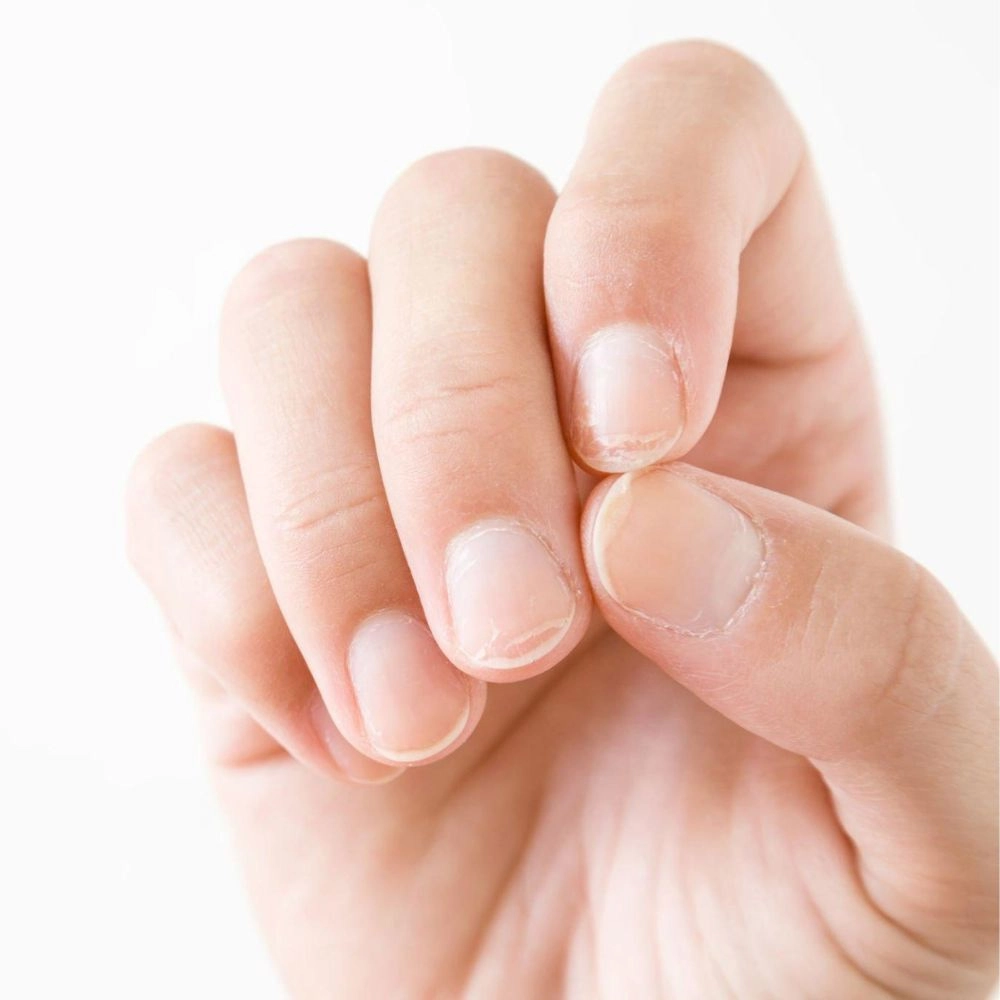Table of content
- Types of BREAST RECONSTRUCTION
- Procedure
- Risks and complications
- Pre-operation preparation
- Post-operative care
- Expected Results and recovery timeline
- Appointments and consultation
- Frequently asked questions
- Meet the team
- Pricing and payment plans
- Medical literature and research
- Support and counseling
- Send a message
BRITTLE NAILS
INDICATION – BRIEF
Brittle nails refer to nails that are easily cracked, chipped, or split, more common in women. Clinically, it can be due to aging, medical conditions like hypothyroidism, anemia, or fungal infections, and nutrient deficiencies. Non-clinically, it can result from exposure to harsh chemicals (like nail polish), overuse or biting of nails, excessive water exposure, and dry, cold weather. Prevention and treatment include protection from damage, regular moisturization, a balanced diet, and, in some cases, treating an underlying condition. Consulting a healthcare provider is always recommended for symptoms and treatment options.

INDICATION – DEFINITION
Brittle nails, also known as onychoschizia or onychorrhexis, refers to the condition where nails become easily cracked, chipped, split, or peeled. This condition can occur on fingernails as well as toenails, and is more commonly seen in women.
Clinical Causes
- Aging: As we age, our nails can become dry and brittle due to decreased production of natural oils and moisture in our nail beds.
- Medical conditions: Certain health conditions can affect nail health. This includes hypothyroidism, anemia, fungal infections, psoriasis, lichen planus, and certain types of dermatitis.
- Nutrient deficiencies: Lack of certain nutrients such as biotin, vitamin C, and certain proteins can lead to brittle nails.
Non-Clinical Causes
- Exposure to harsh chemicals: Frequent use of nail polish, nail polish remover, or exposure to cleaning chemicals can weaken the nails, leading to brittleness.
- Overuse of nails: Using your nails as tools or excessive biting can cause damage and lead to brittle nails.
- Water exposure: Overexposure to water can also cause brittle nails. This is because water logging can expand the nail bed and, when the nails dry, they contract. This constant cycle of expansion and contraction can weaken the nails.
- Environmental factors: Dry, cold weather can contribute to nail brittleness by causing moisture loss.
Prevention and treatment generally involve protecting the nails from damage, moisturizing regularly, maintaining a balanced diet, and potentially taking supplements if a deficiency is suspected. In some cases, treatment of an underlying condition may be necessary. It’s always recommended to see a healthcare provider to discuss symptoms and treatment options.
SYMPTOMS AND DIAGNOSIS
Symptoms
Brittle nails can exhibit a variety of symptoms, including:
- Nails that easily crack, chip, or peel, sometimes without apparent cause
- Nails that show a lack of growth or slow growth
- Nails with vertical or horizontal ridges
- Nails that are thin or flat
- Changes in nail shape, such as nails that are spoon-shaped (concave) or pinched at the tips
- Discoloration or spots of various colors, possibly indicating an underlying disease
Diagnosis
Brittle nails can often be diagnosed during a physical examination. The physician will typically evaluate the appearance of your nails and ask about your history of nail care habits, exposure to chemicals, and general health history.
In some cases, a doctor may take a nail clipping or scrape debris from under your nail for microscopic examination or culture. This can help rule out conditions like fungal infections.
Further diagnostic tests might be necessary if an underlying health condition is suspected. These could include blood tests to check for nutritional deficiencies, thyroid problems, or other medical conditions that might be contributing to the brittleness of your nails.
Please remember that this information is a general guide. If you are experiencing symptoms of brittle nails, it’s important to see a healthcare provider for a thorough diagnosis and treatment plan.
Prognosis and Impact

Prognosis
The prognosis for brittle nails is generally good, especially when the cause is linked to environmental factors or nutritional deficiencies. Changes in nail care habits, improving nutrition, and avoiding harsh chemicals can often lead to significant improvement. In most cases, as new, healthier nails grow in, the condition resolves. However, if brittle nails are due to an underlying medical condition, prognosis will be linked to the management and treatment of that condition.
It’s also important to note that nails grow slowly – about 2 to 3 millimeters per month for fingernails, and half of that for toenails – so full recovery can take several months.
Impact
Brittle nails can impact people in different ways. For some, the impact might be largely cosmetic, affecting their self-esteem or self-perception. For others, particularly those who use their hands in their profession (like musicians or manual laborers), it can interfere with their work.
Moreover, if left untreated and in severe cases, brittle nails can lead to more serious conditions like nail dystrophy or permanent nail damage. Additionally, in some cases, brittle nails might signal an underlying health issue, like malnutrition or thyroid disease, and addressing these underlying issues can be crucial for overall health.
Therefore, while brittle nails might seem like a minor concern, it’s always important to see a healthcare provider if you have any worries or if the condition worsens over time.
Treatment Options
- Nail Care: The first line of treatment is proper nail care. Avoid nail-biting, over-clipping, and over-filing your nails. Protect your nails by wearing gloves when performing tasks that may damage them or expose them to water for extended periods.
- Moisturizing: Regularly moisturize your nails and cuticles. Applying a nail moisturizer or a hydrating nail cream can prevent water loss and keep your nails flexible and less prone to breakage.
- Avoid Harsh Chemicals: Limit exposure to nail polishes and harsh chemicals, such as nail polish removers that contain acetone, which can make nails dry and brittle.
- Diet and Nutrition: Eat a balanced diet. If your brittle nails are due to a nutritional deficiency, you may need to adjust your diet or take supplements. Biotin supplements may be beneficial in some cases.
- Medical Treatments: If your brittle nails are caused by a medical condition (like hypothyroidism or a fungal infection), treating that condition can often improve nail health. Your healthcare provider may prescribe medications or other treatments as needed.
- Nail Hardeners: Some over-the-counter products can provide temporary relief, but prolonged use may result in further damage. Consult with your healthcare provider before starting such treatments.
Risks and Side Effects
- Nail Care: Proper nail care has minimal risks. However, excessive clipping or filing can further damage nails.
- Moisturizing: Over-moisturizing can lead to softening of the nails, which can make them prone to tearing. Some individuals may also have allergic reactions to certain ingredients in nail creams or oils.
- Avoid Harsh Chemicals: While avoiding harsh chemicals poses no direct risks, individuals may experience nail discoloration or mild withdrawal symptoms (like increased brittleness) after stopping products they’re used to, such as nail polish or hardeners.
- Diet and Nutrition: In general, maintaining a balanced diet is low risk and beneficial for overall health. However, over-supplementation, particularly with fat-soluble vitamins (like Vitamin A) or minerals, can have side effects. Always consult a healthcare provider before starting any new supplements.
- Medical Treatments: The risks and side effects here depend on the specific treatment. For instance, antifungal medications can have side effects such as liver damage or skin rash. Thyroid medications can lead to symptoms like palpitations, nervousness, or changes in appetite. Always discuss potential side effects with your healthcare provider.
- Nail Hardeners: While these can provide temporary improvement, prolonged use may make nails more brittle and prone to breakage. Some people may also have allergic reactions to ingredients in these products.
FAQ Section
Brittle nails are a condition where nails easily crack, chip, split, or peel. It can affect both fingernails and toenails and is more common in women.
Causes can be clinical, such as aging, medical conditions, or nutrient deficiencies, or non-clinical, like exposure to harsh chemicals, overuse of nails, excessive water exposure, and environmental factors.
Brittle nails can often be diagnosed during a physical examination. In some cases, nail clippings or scrapings may be analyzed, and further diagnostic tests might be performed if an underlying health condition is suspected.
Symptoms include nails that easily crack, chip, or peel, slow growth, vertical or horizontal ridges, thin or flat nails, and changes in nail shape or color.
Treatment can include proper nail care, regular moisturizing, avoiding harsh chemicals, ensuring a balanced diet, and medical treatments for any underlying conditions.
Risks and side effects depend on the treatment type and can range from mild (like allergic reactions to moisturizers) to more severe (like potential liver damage from certain antifungal medications). Always consult a healthcare provider before starting any new treatment.
Full recovery can take several months, given the slow growth rate of nails. The prognosis is generally good, especially when causes are linked to environmental factors or nutritional deficiencies.
Yes, in some cases, brittle nails might signal underlying health issues like malnutrition or thyroid disease. Therefore, it’s always important to consult a healthcare provider if you have concerns about your nails.
Nail hardeners can provide temporary relief but should be used with caution, as prolonged use may lead to more brittleness. Always consult a healthcare provider before starting such treatments.
Absolutely! A balanced diet is important for overall nail health. Deficiencies in certain nutrients, such as biotin, can lead to brittle nails. It’s always best to consult a healthcare provider or a nutritionist for personalized advice.
Remember, if you have any more questions, we are here to help you.
